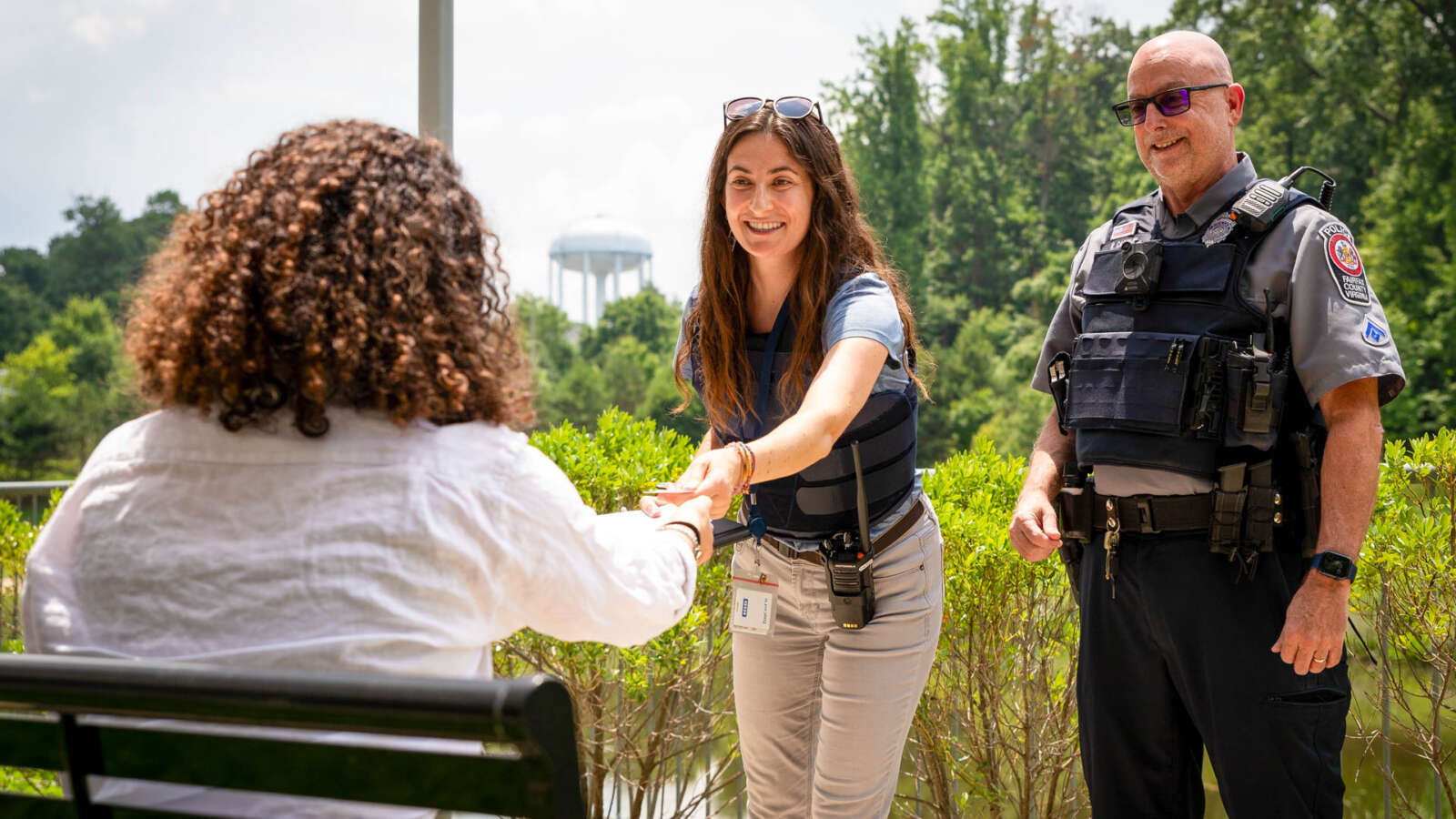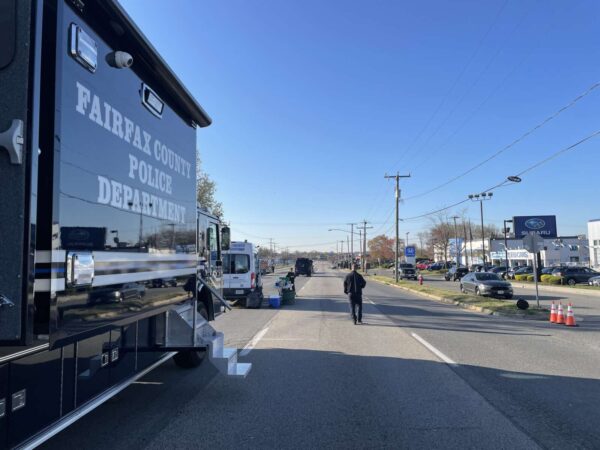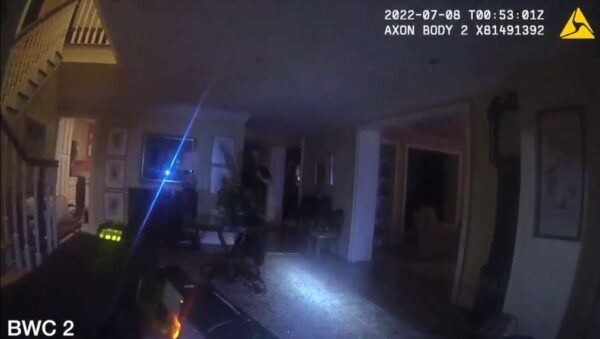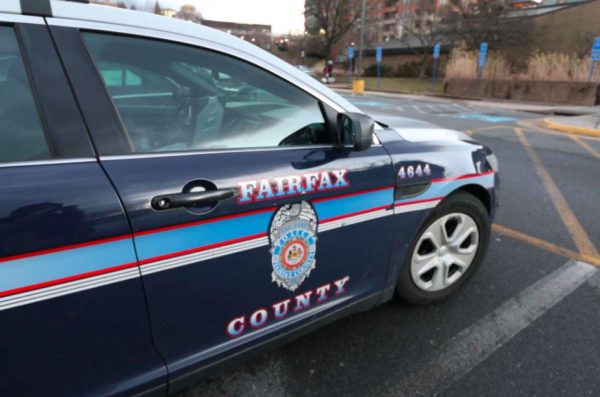
Fairfax County will bolster its capabilities to respond to and resolve emergency calls related to mental health this fall.
The Fairfax County Police Department and the Fairfax-Falls Church Community Services Board presented plans to roll out a fourth co-responder team and a telehealth pilot program at a Board of Supervisors safety and security committee meeting on Tuesday (Aug. 1).
Active since its pilot in March 2021 and made permanent in 2022, the co-responder program pairs a Crisis Intervention Team-trained law enforcement officer with a CSB crisis intervention specialist to respond to behavioral health calls. The duo rides together in the same patrol cruiser and either self-dispatch proactively to behavioral health calls or are dispatched by emergency services, FCPD Lieutenant Joanna Culkin explained during the meeting.
Co-responder teams aim to de-escalate situations involving an individual with a mental health crisis without use of force, incarceration or hospitalization to decrease instances of individuals being harmed by law enforcement.
Currently, three co-responder teams operate in the county, according to CSB Division Director of Emergency and Crisis Care Services Laura Maddock.
Two of the teams are active from noon to midnight seven days a week. The third team currently works from 2 p.m. to 11 p.m. three days a week but will expand its coverage to match the other two teams on Aug. 15.
The fourth co-responder team that Maddock expects to join in late September or early October will follow a similar trajectory, starting with three-day coverage before transitioning to operating for a full week.
The continuing expansion of these mental health crisis services comes after the program showed measurable success in a June 30 data pull, Culkin says. She noted that the co-responder program has successfully increased timely on-scene assessment, with the presence of a clinician often de-escalating situations.
“Sometimes just having the clinician show up paired with our law enforcement counterpart puts people at ease and lets them know that, really, behavioral health is the main focus of our response,” Culkin said.
Culkin cited increased linkages to behavioral health services and higher levels of care, decreased rates of incarceration and arrest, and decreased visits to emergency services as benefits of the program. She said the program helps address “the [psychiatric] bed capacity issue across the state of Virginia” by resolving many cases in the field so fewer individuals need further care.
Of the 1,300 calls that got a co-responder response since the program began, 50% were resolved in the field, 30% were diverted from arrest or hospitalization, 26% resulted in higher level of care and 17% resulted in an Emergency Custody Order and/or Temporary Detention Order, Culkin said.
“That 17% is a really good number for us,” Culkin said. “When we’re looking at if a regular patrol officer had responded…without the ability to do those timely on scene assessments or come up with a safety or care plan, we’re looking at a significantly higher number of ECOs and TDOS.”
To further illustrate the co-responder program’s impact, Culkin recounted an instance where a clinician successfully worked with officers to “talk down” a “distraught subject” who was standing atop a ledge on a parking garage in Dunn Loring and “get him the help he needed.”
On another occasion, a co-responder team responded to a behavioral health call from a man “in emotional distress who indicated that nobody had ever celebrated his birthday.” After helping the man, the pair came back the next day with a birthday cake and enjoyed a belated celebration with him.
“These are good examples of both of the ways the co-responder program has had a positive impact with our community,” Culkin said.
The FCPD and CSB will additionally pilot a new telehealth program following the same fall timeline as the fourth co-responder team. Two police stations in Reston and McLean will receive iPads that officers can use to remotely contact a trained clinician at the Merrifield Crisis Response Center around the clock to fill gaps in coverage, since the co-responder teams don’t operate 24/7.
Maddock hinted that the county is working on implementing a follow-up team, which would consist of a peer and clinician going out to subjects of co-responder cases for check ins and referrals.
FCPD is also striving to increase the number of police officers who have undergone CIT training from 40% to 42% by the end of the year, Culkin said. The number has been slowly increasing over the last couple of years after less than a third of officers had received CIT training in 2021.

An armed woman who police say was experiencing a mental health crisis is now being held without bond at the Fairfax County Adult Detention Center.
The woman, who has been identified as 29-year-old Maryland resident Brittney Copelin, was taken into custody shortly after midnight today (Thursday), ending a shutdown of Richmond Highway in the Hybla Valley area that lasted about 34 hours.
While acknowledging that some business owners and community members grew frustrated by the duration of the barricade, Fairfax County Police Chief Kevin Davis described the handling of the situation as a positive reflection of how police practices have changed over the past decade.
“The reason it took so long was we wanted to get to the best possible outcome for a person involved in a mental health crisis, because that’s what this was,” Davis said at a press conference this afternoon.”There were certainly crimes committed, and we can get into that, but this was ultimately a person in a mental health crisis.”
The Fairfax County Police Department has charged Copelin with two counts of abduction, two counts of use of a firearm in the commission of a felony, and one count of being a felon in possession of a firearm.
She also faces multiple criminal charges in the City of Laurel, Maryland, where she lives in an apartment with a woman whom she has now been accused of abducting.
According to Davis, the saga began on Friday (March 24) when Copelin and the other woman, who hasn’t been publicly identified, left their apartment. The other woman’s mother filed a missing persons report with the Laurel Police Department on Sunday (March 26).
Around 11 a.m. on Tuesday (March 28), the Charles County Sheriff’s Office asked the FCPD to conduct a welfare check on a critical missing person in the 7200 block of Fordson Road, where officers encountered the woman who said she had been abducted.
The officers found Copelin in a 2016 Jeep SUV parked in the 7300 block of Richmond Highway, but when they approached the vehicle, she took off, leading to “a very brief, low-speed pursuit,” Davis said.
Coming to a stop on a service road for Richmond Highway and Lockheed Blvd, Copelin then took out a handgun and put it to her head, according to police.
Davis said the officers reacted appropriately by backing off once they saw the gun and calling in the department’s SWAT team. A roughly 1-mile stretch of Richmond Highway was closed between Lockheed Blvd and Boswell Avenue, as special operations officers, crisis negotiators and mental health clinicians arrived on the scene. Read More

(Updated at 4:15 p.m.) The clinician who participated in an initial mental health call at a McLean house in early July wasn’t present for a subsequent call that concluded in a fatal shooting because he was doing paperwork, Fairfax County Police Chief Kevin Davis said today (Thursday).
The Fairfax County Police Department currently has just one mental health clinician available to accompany officers on calls for mental and behavioral health crises as part of the county’s still-new co-responder program, according to Davis.
During the July 7 encounter, as shown by newly released audio and video footage, two officers deployed electronic control weapons, and a third — identified in the updated news release as Police Officer First Class Edward George, a 10-year veteran — fired his gun, shooting and killing 26-year-old Jasper Aaron Lynch.
All three officers had received crisis intervention training, but the co-responder clinician who joined them on the first call to the scene in the 6900 block of Arbor Lane was absent when the team was called back.
“That clinician had moved on to another location at the conclusion of his tour of duty to complete some administrative paperwork,” Davis said. “That’s the only reason why the clinician was not in a place where he was able to respond with us to the second call for service.”
With the current budget that took effect on July 1, the Fairfax County Board of Supervisors approved funding to permanently expand the co-responder program, which was introduced as a pilot in spring 2021.
According to Davis, the program will advance to the second of four phases with the addition of another clinician on Monday (Aug. 8). The FCPD will ultimately have 16 clinicians riding along with officers, with about eight on duty at any given time.
Even at full force, co-responder teams will only be able to address a fraction of the thousands of mental health-related calls that come through 911. In 2022 so far, the FCPD has responded to 6,700 calls for service — or about 33 calls per day — for persons in mental or behavioral health crisis, Davis said.
Davis noted that the number for the National Suicide Prevention Lifeline has been simplified to 988, offering an alternative to calling the police for situations where someone is in crisis.
“[The co-responder model] is not a silver bullet,” Davis said. “I think it’s our responsibility, both law enforcement and even local media, to manage expectations. It certainly will result in many more better outcomes for people in crisis.”
For the most part, the 911 call and body-worn camera video released today align with the FCPD’s preliminary account of the events leading up to Lynch’s death. Read More
(Updated at 12:05 p.m. on 9/30/2021) Fairfax County will resume an effort today (Wednesday) to avoid arresting people in mental health crises by using behavioral health experts in the hopes of eventually putting the service into effect 24/7.
Pairing a crisis intervention specialist with specially trained police officers, the “co-responder” teams address 911 calls related to behavioral health issues for the resumed service, a micropilot program that’s expected to be in place three days a week.
“Over time, we’re going to have a better sense of handling these types of calls, and we might get to a place where we don’t have to have both behavioral health and police at the same time,” said Lee District Supervisor Rodney Lusk, chair of the Fairfax County Board of Supervisors’ Public Safety Committee.
The county initially tested the approach for over a month this past March with teams working in eight-hour shifts Wednesdays through Fridays, ultimately diverting 40% of incidents from potential arrest or hospitalization.
One such case involved a family situation between siblings, where an autistic man assaulted his adult sister, said Abbey May, emergency and crisis services director for the Fairfax-Falls Church Community Services Board (CSB), which provides multiple mobile emergency response services, among other health supports.
“She had locked herself in the bathroom and reported her brother had slipped a knife under the door to intimidate her,” May said.
A co-responder team gathered critical information from talking to the woman, asking what calms her brother down and what makes him upset. The responders explained that they were there to help.
“They were able to successfully de-escalate the situation without the use of force, incarceration, or hospitalization,” May told the Board of Supervisors yesterday (Tuesday) at its public safety committee meeting.
To support the resumed micropilot program, the CSB is reallocating one of its two Mobile Crisis Units. The pairings with police will continue on a limited basis, and it’s unclear how long the initiative will last this time, but it could serve as a bridge to an expanded service, said Lisa Potter, director of the county’s Diversion First program.
The county’s effort to reform how it responds to certain 911 calls comes after Virginia adopted a law last year creating a Marcus Alert system.
Named after high school biology teacher Marcus-David Peters, who was killed by a police officer while experiencing a mental health crisis in 2018, the statewide system is designed to ensure behavioral health experts are involved in emergency responses related to mental health and substance use issues.
According to Lauren Cunningham, communications director for the Virginia Department of Behavioral Health and Developmental Services, the law requires every local CSB to establish either a mobile crisis team or a community care team by July 1, 2026, though as the state’s most populous locality, Fairfax County must have its program set up by July 1, 2023.
As defined by the bill, a mobile crisis team can consist of one or more qualified or licensed mental health professionals, including peer recovery specialists and family support partner, but it explicitly does not involve law enforcement, Cunningham says.
Community care teams, on the other hand, are composed of mental health service providers and can include law enforcement officers. A co-responder model like the one Fairfax County is developing would fall under this approach.
Fairfax County could use its American Rescue Plan Act money to fund an expansion of the micropilot. County leaders have identified a multi-pronged approach that includes having an officer and crisis intervention specialist travel and respond together in teams that would each cover two police districts.
The $4 million ARPA-funded proposal would create four co-responder teams in the field and cover 26 positions — which would include 10 crisis intervention specialists, eight police officers, and other staff — as well as vehicles and other equipment.
While other mental health efforts help divert unnecessary arrests and jailing, the co-responder approach provides real-time 911 responses, May said. Diversion First leaders have pressed to eventually make the effort available around the clock.


